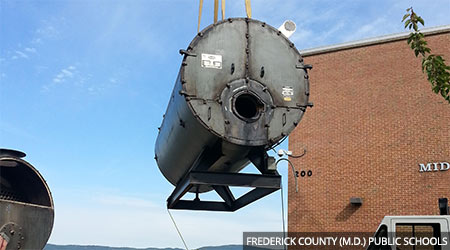Managers' Roles Vary in Trying to Secure Funding for K-12 Retrofits
Part three of a six-part article on funding K-12 retrofit projects
Managers in K-12 schools typically play important roles in their districts’ efforts to secure funding for major upgrade projects.
The roles and levels of involvement vary for managers, often based on the size of district. In some instances, engineering and maintenance managers serve as the public face for a district’s efforts to earn additional funding through a referendum.
John Fuhrer, the director of operations with North Shore School District No. 112 in Highland Park, Ill., takes on those duties in his K-8 district.
“It is a little more unique here,” he says. “I can’t explain how it evolved. It’s just how it’s been. They ask us to be very out front, more at a board level, between the community and the board, and us to lean on every resource in the district.”
For DuPlessis, communicating with the administration at school board meetings and with the public during community forums to help secure funding comes easily. With a private-sector background in business development before joining the Arlington district, DuPlessis developed the appropriate communication skills and routinely spent time in front of school boards across the country discussing products and systems.
“I was very fortunate to be able to do that,” she says. “A lot of folks who are spending time in maintenance may not be accustomed to doing that. That’s why I think exposure to those kinds of situations is very helpful.”
The ability of managers to convey their knowledge about technology and systems often can help their departments tip the scales in favor of funding upgrade projects.
“Most any manager is going to be asked to explain the needs,” DuPlessis says. “Most of the people outside facilities aren’t accustomed to being asked about things like types of piping, types of ballasts, and foot candles.
“To be able to explain what that actually means, to be able to explore other options such as life-cycle costs, are pretty typical. I’ve also tried to be very proactive on drafting communications and giving people the opportunity to review it when there is time.”
Wilkinson describes his role in the Frederick County district on financial decisions as “to define the need and justify the need.”
“What that means is, I work with my maintenance staff to identify the systems that are failing or that are single points of failure that, if it failed would adversely affect school occupancy,” he says. “I’ll look at a boiler approaching 30 years of age, and I’ll ask the maintenance technicians what they think about its condition and repair history.
“Not only do I have to promote the project internally, but once we go before the state to seek funding, we can expect to field very discerning questions.”
Some managers might feel uncomfortable making a case for funding or explaining the way a system works in front of administration or school-board members, so DuPlessis tries to prepare her employees for such occasions.
“I’ve worked with people in the past who were very uncomfortable with it, and it wasn’t because they didn’t have the skill to do it. They had just never been shown how to do it or encouraged to practice it,” she says.
“We’ve had several people in the office who we’ve sat down and asked, ‘If you were going to explain this to somebody on the school board, how would you explain that?’”
Related Topics:
















